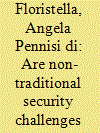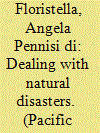| Srl | Item |
| 1 |
ID:
118941


|
|
|
|
|
| Publication |
2013.
|
| Summary/Abstract |
How are regional organizations responding to the emergence of non-traditional security (NTS) challenges? Are they engaging in more cooperative efforts to meet new threats? Or, on the contrary, do they react in different manners according to their distinctive values, principles and internal structures? This article attempts to investigate how the threats posed by NTS are compelling different regional organizations to reconsider their security thinking and to find new innovative ways of cooperation. This is done by comparing two diverse regional organizations, the EU and the Association of Southeast Asian Nations (ASEAN), whose models of security cooperation have significantly varied reflecting the preference for different security approaches. The EU's security system has been more formalized and institutionalized; conversely, the "ASEAN way" has traditionally been rooted in the principles of informality and consensus. It is argued, however, that the emergence of NTS threats is acting as a catalyst behind a normative and operational shift of the modus operandi of both organizations. In so doing, this empirical analysis will try to shed light on the effects of exogenous factors on the emergence of patterns of convergence within the security sphere of distinctive regional processes.
|
|
|
|
|
|
|
|
|
|
|
|
|
|
|
|
| 2 |
ID:
144535


|
|
|
|
|
| Summary/Abstract |
Over the past two decades, natural disasters have severely hit the Southeast Asian region causing dramatic environmental, economic and social consequences. Through the lens of Beck's risk society framework and the theory of reflexive modernization, this article attempts at empirically taking stock of how the Association of Southeast Asian Nations (ASEAN) is addressing disaster risk through the creation of new regional institutions and mechanisms. In particular, it argues that the accumulation of the experience of catastrophes is leading ASEAN members towards the development of new precautionary initiatives to deal with disasters, and to forge a new way forward for the promotion of disaster cooperation and joint emergency response. The article is divided into five sections, which will only consider initiatives endorsed within the ASEAN framework. The first introduces risk societies as forms of modern societies and of the insecurities of the present world. In the second section attention is drawn to natural disasters as a paradigmatic example of Beck's risk society. The third section explores how ASEAN normative governance is evolving to include the issue of disaster management within its security and social agenda. Then the main institutional and operational innovations and tools through which ASEAN is preparing to deal with disaster risk are explored. Finally, the article suggests that despite ASEAN overall institutional innovations, the practice of cooperation still is effected by several factors, above all the lack of adequate resources and the difficulty of reconciling principles of solidarity with national sovereignty, which hinder ASEAN effectiveness in this area.
|
|
|
|
|
|
|
|
|
|
|
|
|
|
|
|